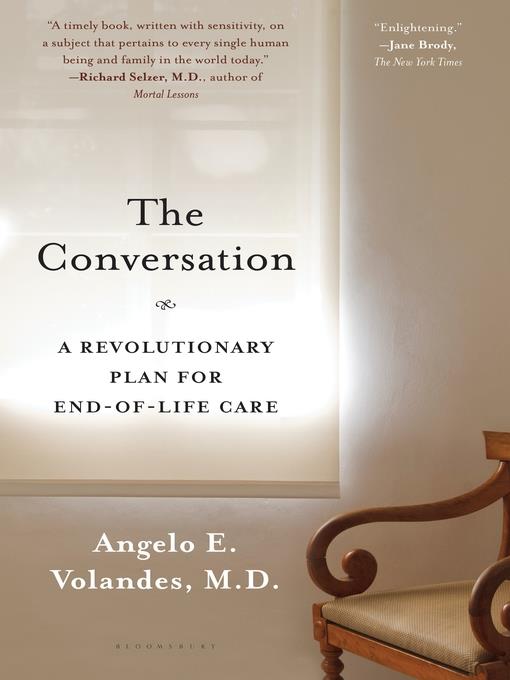
The Conversation
A Revolutionary Plan for End-of-Life Care
برنامه انقلابی برای مراقبت از پایان زندگی
کتاب های مرتبط
- اطلاعات
- نقد و بررسی
- دیدگاه کاربران
نقد و بررسی

November 1, 2014
Harvard Medical School researcher Volandes, founder of Advance Care Planning Decisions, draws the curtain aside to reveal the painful realities of dying in a hospital setting.Despite tremendous advances prolonging life, writes the author, "[b]y most accounts, [the] transformation of death from a natural process occurring at home to a medicalized event taking place outside the home has been disastrous." Volandes explores the options open to patients and their families. Taking examples from his experiences as a physician, he describes how his perspective changed over time and how he has been able to help families make tough end-of-life decisions. Helping patients and their families anticipate their choices is important. Therefore, it is necessary to have an open conversation in advance regarding the alternatives-e.g., painful medical intervention to extend life or palliative treatment to ease a patient's last moments. "Without this open conversation about death," writes the author, "patients are traumatized needlessly, leaving their families with the emotional scars of witnessing hyper-medicalized deaths of their loved ones." Volandes references surprising results from a 2007 research study showing that patients who chose palliative care actually lived longer. He also cites a 2008 study that involved 332 patients who were suffering from advanced cancer. "The researchers found no evidence of distress or psychiatric illness in patients who had end-of-life discussions with their physicians," he writes. Volandes describes how he prepared patients and their proxies for the kinds of decisions they would face as they sought an optimal balance between prolonging life and palliative care. In many cases, he would take them to intensive care units to witness end-of-life treatment. In the appendices, the author offers guidelines and resources available to families facing difficult end-of-life decisions. A compassionate and informative treatment of a painful subject.
COPYRIGHT(2014) Kirkus Reviews, ALL RIGHTS RESERVED.

January 1, 2015
Patients and doctors together all too frequently avoid one of the most important areas of health care: making advance decisions about care at the end of life. From both a personal and an evidence-based practice perspective, Volandes (Harvard Univ.; founder, Advance Care Planning Decisions) attempts to show both why these vital conversations need to happen and how to facilitate them. The subject has been of interest to the author throughout his career, and his research is among the most focused. Here he provides the stories of seven terminally ill patients who have dealt with making decisions in a variety of ways. His investigations, including a number of randomized controlled trials, have looked specifically at the use of videos that explain to patients what happens in three levels of care: life-prolonging, limited medical, and comfort. The trials reveal that neutral but informative videos combined with conversations with a physician leave patients better informed and more comfortable making their choices. Provided are three appendixes to help patients, physicians, and families begin the conversation. VERDICT Written with passion and clarity, this book moves beyond others on the topic by including empirical evidence of how to make such conversations about end-of-life care most effective.--Richard Maxwell, Porter Adventist Hosp. Lib., Denver
Copyright 2015 Library Journal, LLC Used with permission.

























دیدگاه کاربران